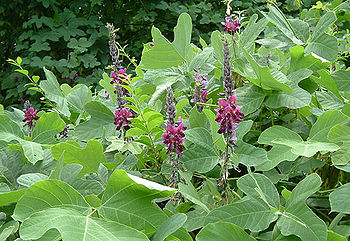Kudzu
Other Names: Bidarikand, Daidzein, Dolichos hirsutus, Dolichos lobatus, Fen Ke, Fenge, Gange, Ge Gen, Gegen, Indian Kudzu, Isoflavone, Isoflavones, Japanese Arrowroot, Kakkon, Kudsu, Kudzu Vine, Kwaao Khruea, Mealy Kudzu, Neustanthus chinensis, Pachyrhizus thunbergianus, Pueraria, Pueraria candollei, Pueraria hirsuta, Pueraria lobata, Pueraria lobata var. chinensis, Pueraria mirifica, Pueraria montana var. lobata, Pueraria montana var. thomsonii, Pueraria pseudohirsuta, Pueraria Root, Pueraria thomsonii, Pueraria thunbergiana, Pueraria tuberosa, Radix Puerariae, Red Indian Kudzu, Thai Kudzu Root Extract, Vidarikand, Vigne Kudzu, White Indian Kudzu, Yege.
Kudzu is a vine. Under the right growing conditions, it spreads easily, covering virtually everything that doesn’t move out of its path. Kudzu was introduced in North America in 1876 in the southeastern U.S. to prevent soil erosion. But kudzu spread quickly and overtook farms and buildings, leading some to call to kudzu "the vine that ate the South.”Kudzu’s root, flower, and leaf are used to make medicine.
See also : Pueraria Mirifica (Thai Kudzu)
Special Precautions of Kudzu
- Kudzu is POSSIBLY SAFE for most people when used appropriately for up to four months.
- No side effects have been reported in clinical studies when kudzu is taken by mouth. There is, however, one case report of allergic reaction following use of a combination herbal product containing kudzu (Kakkonto).
- Intravenously, the kudzu ingredient, puerarin, has been associated with itching and nausea. It has also caused red cells to break inside blood vessels.
- Bleeding or blood clotting disorders: Kudzu might slow blood clotting. It might make bleeding and blood clotting disorders worse, and it might also interfere with medications used as treatment.
- Cardiovascular (heart and blood vessel) conditions: There is a concern that kudzu might interfere with cardiovascular treatments. Kudzu extracts seem to lower blood pressure and affect heart rhythm in animals.
- Diabetes: Kudzu might affect blood sugar levels in people with diabetes. Watch for signs of low blood sugar (hypoglycemia) and monitor your blood sugar carefully if you have diabetes and use kudzu.
- Hormone-sensitive condition such as breast cancer, uterine cancer, ovarian cancer, endometriosis, or uterine fibroids: Kudzu might act like estrogen. If you have any condition that might be made worse by exposure to estrogen, don’t use kudzu.
- Birth control pills (Contraceptive drugs) interacts with KUDZU
- Estrogens interacts with KUDZU
- Medications that slow blood clotting (Anticoagulant / Antiplatelet drugs) interacts with KUDZU
- Methotrexate (MTX, Rheumatrex) interacts with KUDZU
- Tamoxifen (Nolvadex) interacts with KUDZU
- Medications for diabetes (Antidiabetes drugs) interacts with KUDZU
Benefits and uses of Kudzu are
It has been used in Chinese medicine since at least 200 BC. As early as 600 AD, it was used to treat alcoholism. There is information that suggests kudzu contains ingredients that counteract alcohol. It might also have effects like estrogen. Chemicals in kudzu might also increase blood circulation in the heart and brain.
- Chest pains. Some research suggests that puerarin, a chemical in kudzu, might improve signs and symptoms of chest pain when given by mouth or intravenously (by IV). Some evidence suggests that using IV puerarin in combination with usual treatment might be more effective than usual treatment alone. However, studies on puerarin are generally of poor quality and might not be reliable. Puerarin injection products are not available in North America.
- Alcoholism. Preliminary research suggests that heavy drinkers who take kudzu extract for 7 days consume less beer when given an opportunity to drink. But kudzu doesn’t seem to decrease the craving for alcohol or improve sobriety in chronic alcoholics.
- Symptoms of menopause. Kudzu taken by mouth does not affect the things that change in women at menopause, including sex hormone levels, blood fat levels or bone density. It also doesn’t seem to reduce symptoms of menopause. Kudzu may, however, have a positive effect on the mental abilities of postmenopausal women.
- Stroke. An intravenous (IV) form of puerarin, a chemical in kudzu, has been used in China to treat patients with ischemic stroke, the type of stroke that is caused by a blood clot. But results have been mixed. One study found no benefit. Another found benefit, but the study design has been criticized and the results questioned.
- Symptoms of alcohol hangover (headache, upset stomach, dizziness and vomiting).
- Muscle pain.
- Measles.
- Dysentery.
- Stomach inflammation (gastritis).
- Fever.
- Diarrhea.
- Thirst.
- Cold.
- Flu.
- Neck stiffness.
- Promoting sweating (diaphoretic).
- High blood pressure.
- Abnormal heart rate and rhythm.
